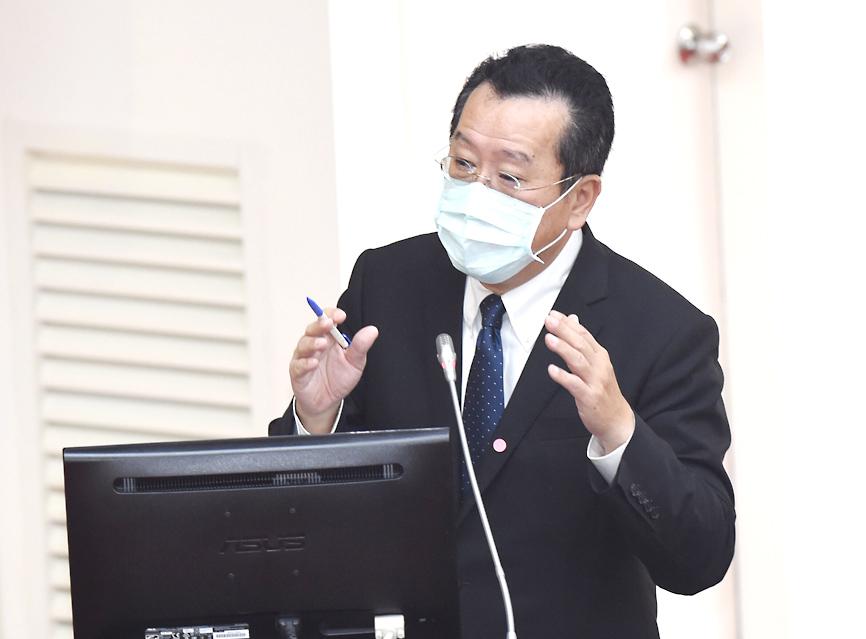The Financial Supervisory Commission (FSC) has asked banks to expedite the review and processing of loans of less than NT$5 million (US$165,827) to help companies affected by the COVID-19 outbreak.
Banks should decide whether to approve such loans within 15 working days, the FSC said, adding that it could further reduce the review period to within seven days for loans under NT$1 million.
“Banks usually have a set of procedures for arriving at a decision, such as interviews with applicants, credit checks, collateral appraisal and on-site examination,” a commission official said by phone.

Photo: Chien Jung-fong, Taipei Times
“We are not asking them to skip any steps as they still need to monitor loan quality. However, we hope they can make a decision faster on whether to approve or reject a loan to lessen the pressure on borrowers,” the official said.
The commission, which last month asked all banks to provide loan extensions for businesses hit by the pandemic, ordered banks to approve the extension within two weeks, but left it to banks to decide on the duration of the extension and the interest rate.
As of Monday, local banks have received 2,322 applications totaling NT$35.18 billion from affected businesses, and approved 510 applications, or a total of NT$7.39 billion in loans, commission data showed.
To provide an incentive, the commission would reward banks that offer the most assistance to affected firms by allowing them to launch new programs or products in the future.
Chinese Nationalist Party (KMT) Legislator William Tseng (曾銘宗) yesterday said that the measure might not be helpful to small and medium-sized enterprises (SMEs).
Among the nation’s 1.46 SMEs, 89 percent, or 1.3 million, have never applied for credit, Tseng told a meeting at the Legislative Yuan.
“The interest rate for loans of less than NT$2 million is just 1 percent, which should be attractive to borrowers. We can help enterprises that have never applied for a bank loan,” FSC Chairman Wellington Koo (顧立雄) said.
Compared with the state-run banks, privately owned banks have offered less help, approving 117 applications or NT$2.78 billion in loans, accounting for 23 percent and 37 percent respectively of the total, commission data showed.
“It is not that we are less willing to help affected businesses, but as a private company, we have to scrutinize loan applications, as we are under more pressure if our non-performing loan ratio rises,” a bank manager said by phone on condition of anonymity.
If the government eases its regulations on non-performing loan ratios, such as allowing banks to write off bad debts later, banks would be less conservative, he said.

In Italy’s storied gold-making hubs, jewelers are reworking their designs to trim gold content as they race to blunt the effect of record prices and appeal to shoppers watching their budgets. Gold prices hit a record high on Thursday, surging near US$5,600 an ounce, more than double a year ago as geopolitical concerns and jitters over trade pushed investors toward the safe-haven asset. The rally is putting undue pressure on small artisans as they face mounting demands from customers, including international brands, to produce cheaper items, from signature pieces to wedding rings, according to interviews with four independent jewelers in Italy’s main

Japanese Prime Minister Sanae Takaichi has talked up the benefits of a weaker yen in a campaign speech, adopting a tone at odds with her finance ministry, which has refused to rule out any options to counter excessive foreign exchange volatility. Takaichi later softened her stance, saying she did not have a preference for the yen’s direction. “People say the weak yen is bad right now, but for export industries, it’s a major opportunity,” Takaichi said on Saturday at a rally for Liberal Democratic Party candidate Daishiro Yamagiwa in Kanagawa Prefecture ahead of a snap election on Sunday. “Whether it’s selling food or

CONCERNS: Tech companies investing in AI businesses that purchase their products have raised questions among investors that they are artificially propping up demand Nvidia Corp chief executive officer Jensen Huang (黃仁勳) on Saturday said that the company would be participating in OpenAI’s latest funding round, describing it as potentially “the largest investment we’ve ever made.” “We will invest a great deal of money,” Huang told reporters while visiting Taipei. “I believe in OpenAI. The work that they do is incredible. They’re one of the most consequential companies of our time.” Huang did not say exactly how much Nvidia might contribute, but described the investment as “huge.” “Let Sam announce how much he’s going to raise — it’s for him to decide,” Huang said, referring to OpenAI

The global server market is expected to grow 12.8 percent annually this year, with artificial intelligence (AI) servers projected to account for 16.5 percent, driven by continued investment in AI infrastructure by major cloud service providers (CSPs), market researcher TrendForce Corp (集邦科技) said yesterday. Global AI server shipments this year are expected to increase 28 percent year-on-year to more than 2.7 million units, driven by sustained demand from CSPs and government sovereign cloud projects, TrendForce analyst Frank Kung (龔明德) told the Taipei Times. Demand for GPU-based AI servers, including Nvidia Corp’s GB and Vera Rubin rack systems, is expected to remain high,